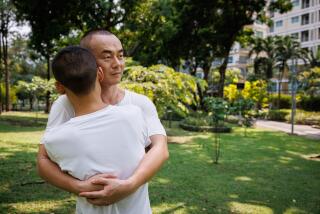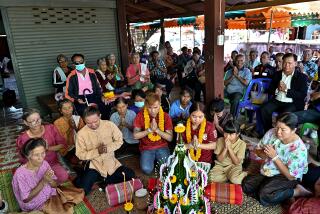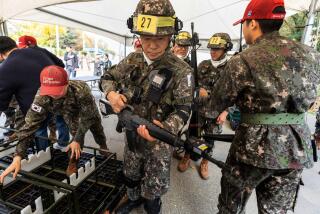China’s ‘Lost Army’ Sees Future in Tea
- Share via
MAE SALONG, Thailand — As the mists swirl around this mountain settlement, it’s easy to imagine the old soldiers from China’s “lost army”--their ranks withered by wars and time--setting off on their last march.
They might not be marching off to paradise, given their history of drug smuggling and other nefarious deeds.
But these embattled veterans seem to deserve some tranquillity after surviving China’s cataclysmic revolution, bloody battles and heartache over a half-century of exile.
“We had no money, no food, no guns and no country. We had nowhere to go,” said Gen. Lue Ye-tein, at 86 one of the last of the Kuomintang officers who fled China’s Yunnan province in 1949 as Communist leader Mao Tse-tung consolidated his victory over Chiang Kai-shek’s nationalists.
From the chaos of China’s revolution, the remnants of the Kuomintang found themselves unwelcome guests in Myanmar (then Burma). In the early 1960s they were forced into northern Thailand, where they were enlisted to help fight communist guerrillas in exchange for asylum.
“The past was a nightmare. Let’s look to the future,” the sprightly, ramrod-straight Lue likes to say.
For the old men of the Kuomintang’s 93rd Division--dubbed the “lost army” after it fled China--the future for them and their descendants seems to lie in tea, tourism and gradual integration into Thai society.
Once a largely isolated state within a state run by its own secretive military commanders, Mae Salong welcomes tourists, many from Taiwan and Chinese communities elsewhere in Southeast Asia and China.
Red lanterns and scrolls inscribed with sayings from Chinese classics sway from the eaves of Yunnanese-style houses. Elders converse in Mandarin. Ruddy youngsters practice Chinese characters from books sent by Taiwan.
“This is still a Chinese town,” said Chang Zhu-ping, a friendly young businessman offering cups of the strong local brew at one of the many tea shops on the town’s main road.
Five sizable tea plantations and many smaller family-run plots blanket Mae Salong’s hillsides. Some of the larger enterprises are joint ventures with Taiwanese, who provided technical expertise and introduced the more profitable oolong variety.
A tea theme park is being built by the wealthy son of an ex-Kuomintang soldier. Two giant tea kettles, painted silver and gold, are nearing completion, and four more are planned.
Soon, tea fanciers will be able to sample teas from throughout the world--and stay overnight inside one of the concrete kettles.
Lue says Thai authorities encourage maintaining Mae Salong’s Chinese look and atmosphere to attract tourists’ money.
But the town faces economic and social problems. Sun Jiang, a shop owner and brother of the town headman, estimates that 90% of its high school graduates must leave to find work in the Thai capital of Bangkok or in Taiwan.
Chiang Kai-shek had his Kuomintang government in Taiwan, and the Taiwanese built Mae Salong’s school and sent teachers.
But Sun says most Mae Salong youths who go to Taiwan can find only menial work, do not marry Taiwanese women who tend to look down on them, and often feel like strangers despite the shared culture, language and history.
“Truly the people of Mae Salong are smart, and they work hard, but they don’t have many opportunities,” Sun said.
The Kuomintang 93rd Division trekked out of Yunnan into Myanmar after Mao’s victory in 1949. Into the early 1960s, the soldiers staged futile forays into their homeland with aid from Taiwan and the United States. Lue, the old general, remembers it as a time of great hardship.
It also was a time when the Kuomintang soldiers gained a reputation as opium traffickers and smugglers of jade and antiques.
Lue denies that his men were ever involved in narcotics, in Myanmar or Thailand. “We had to fight here and there. How could we have planted opium?” he said.
But his predecessor as Kuomintang commander in Mae Salong, Gen. Tuan Shi-wen, once admitted: “We have to continue to fight the evil of communism, and to fight you must have an army, and an army must have guns, and to buy guns you must have money. In these mountains, the only money is opium.”
Chased out of Myanmar, the Kuomintang fighters split into two armies when they moved to Thailand.
Tuan, whose pagoda-style mausoleum overlooks the town, set up at Mae Salong.
Gen. Ly Wen-huan moved his men to neighboring Chiang Mai province.
Both colonies were closed, regimented societies with residents restricted to the area by Thai authorities, but the Chinese exiles and their hosts came to arrangements of mutual benefit.
The Kuomintang helped fight Thai communists, then disbanded its military organization in the mid-1980s.
Thailand’s government began to grant citizenship, although some among the estimated 20,000 Kuomintang soldiers and their families are still awaiting Thai papers.
China receded in the collective memory even though tourists and businessmen come from China and a few men from Mae Salong have married women from the old homeland.
“Here people still hate the communists. They think of themselves as truly Thai,” Lue said.
“China is ready to receive them but they don’t want to go back.”
More to Read
Sign up for Essential California
The most important California stories and recommendations in your inbox every morning.
You may occasionally receive promotional content from the Los Angeles Times.













